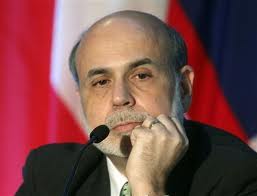I’ve found the problem in Washington… it’s some sort of time warp, or they’re just dumb.
Saturday night, while I was searching around on iTunes for a podcast on the economy… (OMG, did I just say that out loud? How sad is that? Let’s just keep that part about Saturday night between us, okay?)
But, you know the deal, right? I’ve been doing more and more podcasts and a lot of people really like them and I wanted to see how other podcasts are done in case there was something I could do better or add in, whatever. In other words, I was checking to see if there were any ideas I could steal… LOL
So, I happen upon a podcast published a few days ago… January 13, 2012… available free on iTunes: NPR on the Economy. The show’s host is David Green from Morning Edition, and his guest, David Wessell, is the Wall Street Journal’s Economics Editor, and the author of “In Fed We Trust: Ben Bernanke’s War on the Great Panic.”
The topic was the Federal Reserve and how Fed officials have been talking to congress about how our country’s economy can’t recover without the housing market, so I figured… perfect… it’s my favorite issue. Green opens the show by saying:
“Lately, Federal Reserve officials have been focusing on housing… they’ve been out in public pushing measures they think will help the housing market.”
Have they now, I thought to myself. How could I have missed the Fed doing that?
Green kicked the discussion into gear by broadly asking Wessell what the Fed is trying to do. He replied that Fed officials have been saying in speeches and in a 26 page white paper that’s apparently been sent to congress recently, that one reason our economy isn’t doing better is that our housing market is not healing very fast.
I couldn’t help but wonder how that idea could possibly take up 26 pages, but then remembering that it was the Federal Reserve we were talking about, I figured that the first 25 pages were probably cherry-picked data points showing how well the economy is doing, with this tidbit about housing on page 26.
Wessell went on to point out that the President of the New York Fed recently said the following:
“… it was difficult to achieve economic recovery unless the ongoing weakness in housing was addressed,” and that the new President of the San Francisco Fed, John Williams, talked about a “housing depression.”
The “housing depression” phrase caught my attention, as I’m sure it did yours, but then I figured he probably used the phrase in the context of what we would avoid, thanks to the swift and decisive actions of the Fed.
You see, I’m not falling for another goofy “we’re going to save the housing market plan,” that turns out to be another voluntary refinancing program that Fannie and Freddie have already pronounced DOA, but that we won’t hear the abysmal results for until next year at this time.
According to Wessell the Fed is now saying that they’ve done what they can to get the economy working better, and that now the other areas of the government are going to have to pay attention to getting the housing and mortgage market going again.
Sort of a funny way to phrase things, don’t you think? It sort of made it sound as if we’re supposed to believe that the last three years have been somehow planned the way sub-contractors work together when building a home… “Okay, Congress… we’ve got the framing up, the electrical wired and the slabs poured so you can go ahead with the tile, the window treatments and doors.”
Of course, the reality is that the last three years have looked and felt more like a scene out of Ringling Bros. Greatest Show on Earth, when something like 50 clowns all come rushing in from everywhere, ten of them get out of a tiny car, one gets shot from a cannon, and three monkeys in spandex start circling on bicycles while blowing noisemakers.
Wessell then tells Green that the Fed is now saying that “the alphabet soup of programs that the government has tried to help housing and homeowners isn’t doing enough.” Green asks if they had any suggestions as to what should be done and Wessell sounds almost exuberant when he replies that yes, “they’ve come up with a list of things they think the government ought to do.”
At this point, the anticipation was practically killing me, and I thought I might pee my pants if I didn’t hear what the Fed had in mind soon. It’s an election year, you see… and as such, anything is possible. If you don’t think so, just consider that Obama, after presiding over an administration that pumped $16 trillion into financial sector, is again running as some sort of populist.
So, Green and Wessell then start listing the things the Fed presented to congress in its white paper ostensibly in order to heal the housing market and thereby remove the last standing impediment to beginning our march back to economic prosperity in earnest.
And please remember… in the third paragraph from the top of this article, I placed a link to the specific NPR podcast to which I’m referring, and the reader is encouraged to listen to it after reading what follows to confirm that I have faithfully reprinted what was said by Wessell… verbatim, as it were.
What the Fed told congress will be in bold type, my questions and comments will be plain text.  I really need everyone’s help here, because I think I may have discovered some sort of glitch in the space-time continuum that would explain why Washington appears so entirely out of touch with reality and the rest of the country, if not the world. Either that, or maybe they’re all just dumb and that’s why they wanted government jobs.
 1.   The Fed thinks the government “ought to find a way to reduce the glut of houses for sale, because the banks have taken over so many foreclosed houses there’s just a glut of supply and they’d like to make it easier for banks and others to rent them out in order to reduce the number for sale.”
- First of all, why does the Fed think there’s a “glut of houses for sale?” Did someone tell them that’s the case because I think that person may have just been pulling their little Feddy legs. You see… there isn’t any sort of “glut” of homes on the market. That’s why it’s called the “shadow inventory,” right? If the homes were on the market and for sale, I think they’d just call it “the inventory,” and drop the whole “shadow” part.
- Banks renting out homes does nothing to reduce the number of homes for sale. Renting out a vacant home does reduce the number of vacant homes, but renting a home doesn’t preclude its owner from selling it. So, if a home was on the market before it was rented, it’s likely still on the market after you rent it out.
- The only ways that one could reduce the supply of homes for sale would be to: 1) Stop building new homes and listing them for sale. 2) Stop kicking people out of the ones they own. 3) Tear down the houses listed for sale. 4) Start promising doctors, lawyers, or other high income or net worth individuals that are citizens of foreign countries that if they move here, we’ll give them a new car and send their kids to Harvard for free. 5) Start giving away homes on game shows.
- And there are no anti-renting statutes in this country that I could find. In fact, in this country it’s really already very easy to rent something to someone assuming there’s someone who wants to and can rent it. Maybe someone should introduce the Fed to Craig’s list.
More importantly, are we experiencing a shortage of homes that are available for rent? I looked online for rentals in zip codes all over the country, and there were rental properties available in all of them.  I think today there are two reasons that many people don’t have a home of their own in which to live: a shortage of money… or the shortage of jobs that pay good money.
If the Fed is so concerned that a glut of homes for sale will derail any chance we have for recovery in our housing market going forward, which in turn will prevent our broader economic recovery, then why doesn’t the Fed’s list suggest that congress do something to prevent the 10.4 million foreclosures that will occur in the next few years, as forecasted by numerous industry experts whose predictions at this stage are based on hard data and mathematics.
CONCLUSION:
Recognizing that without recovery in our housing market our nation can’t sustain any sort of broader economic recovery, the Fed thinks congress should concentrate on reducing the glut of homes for sale… the glut that technically doesn’t exist yet… by making it easier to rent out repossessed homes?
That’s what we should do instead of doing something to prevent the 10.4 million new foreclosures that are certain to occur in the next few years? The Federal Reserve wrote a white paper to the United States Congress saying that instead we need to address a glut of homes for sale that isn’t here yet by making it easier to rent out repossessed homes?
Read the two paragraphs under CONCLUSION again… slowly. Now, would anyone care to explain that whole situation to me, because I find the whole thing terrifying.
2. The Fed thinks that “more should be done to make sure that the lenders, Fannie and Freddie and the federal banking regulators haven’t over-reacted to the crisis and are being too stingy and too picky about lending.” According to Wessell: “The Fed actually said that if mortgages had been this hard to get over the past few decades, we MIGHT today be a nation of renters.”
- The Fed told congress that if people couldn’t get mortgages over the last few decades we MIGHT today be a nation of renters?  No mortgages available MIGHT have meant more renters? The Fed is not sure that fewer mortgages being available would lead to more renters?? Okay, but I wonder what else MIGHT have occurred.Then, the Fed is UNSURE about why lending in this country is bordering on non-existent and they want Congress to do more to investigate whether there’s been an over-reaction among “picky and stingy” lenders?  Did I get that right?
Aren’t the guys at the Federal Reserve supposed to understand the issues surrounding lending? They are, right?
- The Fed has lowered rates to right around zero percent and pumped TRILLIONS into the financial system through all sorts of vehicles… and it hasn’t had any more sustained impact on lending than had they burned incense while chanting Hopi fertility prayers.
- Is it possible in anyone’s mind that the volume of lending available in this country is related to the degree of over-reaction on some sort of pickiness and stinginess index for bankers?
- Or could it be that a powerful wizard has cast a super glue spell on our nation so that no matter what amount of cash is pumped into our lenders, it sticks to the walls of their vaults and therefore can’t be lent out no matter what.
Isn’t it clear by now that the problem with lending in this country is NOT a LIQUIDITY problem and therefore it cannot be addressed through the use of MONETARY POLICY, of which the Fed is in charge?
You don’t need to be an “industry expert” to know what I’m saying here is true.  If it were a liquidity problem, then lowering the rates and pumping cash into the system would have worked and increased lending. It didn’t, so, it’s not… get it?
One more time…
In this country, ever since the third or fourth quarter of 2007, the securitization market, credit markets, and secondary mortgage markets collapsed and froze solid when investors stopped trusting the credit ratings on mortgage-backed securities and CDOs. Since then, lending in this country had to be effectively NATIONALIZED.
I say that lending has been NATIONALIZED because over the last three or four years, something north of 95% of the loans related to residential real estate were either Fannie, Freddie, FHA, Ginny, and… well, no that’s it, actually.
Remember when the Fed bought $1.5 trillion in mortgage-backed securities a few years back?   Do you understand WHY the Fed bought those mortgage-backed securities? Because NO PRIVATE INVESTORS WOULD BUY THEM. And why might that have been? Anyone? Anyone? Come on now class… let’s not always see the same hands.
They don’t TRUST the securities anymore, very good class. Why doesn’t the Fed remember any of this? Or for that matter, the Economics Editor from the Wall Street Journal… to say nothing of the folks at NPR?
3.   According to Wessell, the Fed “is looking for alternatives to foreclosure, that if someone is not going to be able to pay their loan, and a lender is going to have to take it over, they’d like to find a way to speed the process up so it’s not so cumbersome.”
Okay, so the Fed is “looking for alternatives to foreclosure,” but what the Fed means by that is that they want the foreclosure process to be less “cumbersome?” Less cumbersome than it is now? Seriously? What would that process look like, I’m curious to know?
I mean, now… in order to foreclose as a servicer, you don’t need much more than the relatively unsubstantiated claim that the borrower is not making their mortgage payments. You don’t need to prove you’re the representative of the actual investor(s). You don’t need to prove that the trust actually holds the note or that it was properly negotiated into the trust.  You can use a MERS assignment, even though it’s been established that the MERS database is often wrong. You don’t need to show an unbroken chain of title.
In the non-judicial foreclosure states, you need even less, but my point is that you need so little to foreclose in either type of state that servicers have in numerous instances foreclosed on the wrong homes… yes, even with judicial oversight, the wrong home was foreclosed upon more than once or twice.
And, by the way, should you need any sort of paperwork to effectuate the foreclosure, is absolutely SOP to simply manufacture the documents and forge a signature or two… or three… a few hundred thousand times is fine. Robo-signing is the norm, and I hear the forgeries are getting better, meaning they’re harder to detect.
Oh sure, Nevada has a new tougher law about these things, and other states are sniffing around the need to change things as well, but the Fed wants a “less cumbersome” foreclosure process?
So, what might such a process look like?Â
Maybe the whole thing could be handled by phone or online? That would probably cut down on the need for forged documents. You could just call everything in. The screen would just ask the foreclosing party a series of questions, like do you have the right to foreclose? Yes. Is this borrower in default? Yes. After one or two more questions, the servicer could just email the borrower the eviction notice.
That would be “less cumbersome.”
Look, 85% of homeowners go through the foreclosure process unrepresented by council… they just give up and leave. Borrowers are not slowing the foreclosure process down or making it too burdensome. Servicers are, in the vast majority of cases, and by vast I do mean almost all, able to mow down delinquent homeowners at will.
Last fall, I believe Treasury officials admitted that they thought HAMP a success because it slowed down the foreclosure process at a time when the banks couldn’t afford to take back that many homes. That sentence speaks to accounting policy, and it’s why the banks haven’t taken more homes back to-date. It’s not that the process is too cumbersome.
And I absolutely promise you… the Fed knows this intimately.
WRAP-UP…
After those stunningly brilliant and thought-leading insights, the host asked Wessell what the reaction from congress has been… and Wessell replied first by exclaiming what a good question that was. I sounded like Wessell might have given Green a cookie, if he’d had one in his pocket.
Wessell then said the reaction has been “mixed,” and that Sen. Orin Hatch of Utah, a member of the powerful Senate Finance Committee, “sent a blistering letter to Bernanke saying that the Fed is treading on the turf of congress and the regulators and ought to back off and that he’s sure that the Fed wouldn’t appreciate a white paper from congress outlining how the Fed should be thinking about monetary policy.”
Ohhh, snap!
Wessell went on to explain…
“… some people think that this is putting pressure on the regulator of Fannie and Freddie… the FHFA… to do something more to help the housing market during an election season… the Fed says that’s not so.
Â
Others say that maybe what the Fed is doing is giving the regulator some cover here by saying that the Fed thinks this is a good idea, it’s in the long-term interests of the taxpayer so we ought to do something here.”
Now, Wessell is talking about Ed DeMarco, the guy in charge of the FHFA, which is the conservator for the bankrupt Fannie and Freddie. We’ve been over this with DeMarco in the past and he’s been very clear that his job is to protect Fannie and Freddie in the short run… period.
I want to be blunt here… whoever Wessell got either of those “insights” from… whichever nameless source… they’re both meaningless.
In fact, the whole podcast is meaningless, and that’s at some of its most useful moments. What the heck is going on here?
How does the Fed write a white paper and present it to the United State Congress that is packed with proof positive of an entirely inadequate level of knowledge, understanding… education, even?  Am I going to find out that next week, the Fed sends congress a while paper about some issue from 4-5 years ago, and NPR treats it like it’s hot-off-the-press news again.
Is this evidence of a time warp of some design? Am I on the Truman Show and none of this is real? Are the politicians in D.C. that amateurish and obtuse? Do our politicians simply not care, because so few of us pay any attention?  And what in the world happened to NPR? Was that podcast produced for young children with Down Syndrome or some other physically or mentally impaired group?
I’m serious about this… I want to know how this podcast exists. It’s not 2008… are the people involved just that shallow as far as to their knowledge of the subject? If you’re not with me here, I’d suggest you go back and read what was said slowly. Or, better yet, go up to the third paragraph from the top and you can hear moron one and moron two do idiocy in harmony.
That was David Green on Morning Edition on National Public Radio with David Wessell, Economic Editor from the Wall Street Journal, who joins us regularly to talk about the economy…
Â
Mandelman out.






